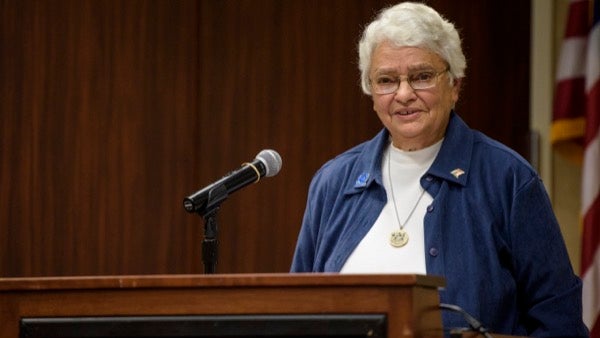The New Bedford, Massachusetts, native shared her story with retired faculty members during a My Intellectual Journey lecture sponsored by the UD Association of Retired Faculty (UDARF) on Thursday, Nov. 5, in the Marriott Courtyard Newark-University of Delaware campus hotel.
Viera recalled growing up in New Bedford and her life experiences on the way to becoming one of the most successful coaches in UD varsity sports history.
“My father was born in the Azores Islands, Portugal, and came to America when he was 13 years old,” Viera said. “His father and older brother had preceded him to the United States.”
The parents of Viera’s mother also came from the Azores, and the family settled in the New Bedford area, known at the time for its fishing industry.
“I was one of four sisters, and I was the one who was my father’s little girl,” Viera said. “I did everything with my dad.”
While her sisters played all played sports, Viera described herself as the one who competed with a passion that would strongly influence her educational and career choices.
“When I was in the sixth grade, I decided that I wanted to be a physical education teacher and a coach,” Viera said. “From that point on, I was going to pursue that direction.”
An excellent student, especially in mathematics, Viera played field hockey, basketball, volleyball, softball and track at Westport High School in Massachusetts.
“My best sport in high school was not actually volleyball, but basketball,” Viera said. “I still own the Westport High School record for female basketball players, having scored 44 points in a single game.”
While guidance under teacher and mentor Barbara Wardell helped build success as a student and athlete, a serious economic crisis in the family nearly forced Viera to give up her dream of going to college.
“My dad lost his job, and the family discussed what the children could do to help out,” Viera said. “The decision was made that one of the children should quit school and work to help support the family. I was devastated. This did not fit into my plans. I didn’t want it to happen.”
Viera’s high school physics teacher, who also was Portuguese, heard about her situation and stepped in to help out.
“He called my parents and asked to come to my house and talk to them. He convinced my parents to let me stay in school,” Viera said. “I owe my career and everything to him.”
The next stop on her educational journey was the University of Massachusetts at Amherst, where Viera found herself in the first class of female students to major in physical education.
During her undergraduate career at Massachusetts, Viera took a volleyball course taught by Ruth Totman, who was head of the physical education department for women.
“She really was responsible for putting the fire for the game of volleyball in my heart,” Viera said. “I knew that this was the course I was going to pursue.”
Because there were no varsity sports for women while she was a student at Massachusetts, Viera became committed to seeing that women would one day have the opportunity to compete and play sports at all levels.
“I decided I would try to change that aspect and to make it possible that women could play any sport that they wanted to play, and could win scholarships and benefit from that,” Viera said. “This became a goal of mine.”
Following teaching and coaching jobs at the junior high and high school level, Viera enrolled in Springfield University. It was during this time that she learned about an opening for a teacher and a coach UD.
“I interviewed and was hired as an assistant professor with coaching responsibilities,” Viera said. “There were three women’s teams in 1969 and two more were added in 1971, including volleyball.”
During her 27 years as volleyball head coach, a tenure that began in 1972, Blue Hen volleyball teams compiled a 682-429 record, with four teams competing in postseason national tournaments, twice through the Association of Intercollegiate Athletics for Women (AIAW) and twice to the National Invitational Volleyball Championship.
Due to Viera’s success, the volleyball court in University of Delaware’s Carpenter Sports Building bears her name.
Viera also coached at the international level, taking teams to compete in Barbados, St. Lucia, Guatemala, Panama, Costa Rica, Argentina and Mexico.
The author of two books on the sport and 30 published articles, Viera received the Herm Reitzes Award for Lifetime Achievement in 2003 and was inducted into the Delaware Sports Museum and Hall of Fame in 2004.
In 2003, Viera was inducted in the University of Delaware Athletics Hall of Fame and the American Volleyball Coaches Association Hall of Fame. Viera also was inducted into the Westport High Hall of Fame in 1989.
Noting that her career at UD paralleled the rise of opportunities for women in sports with the advent of Title IX, Viera said it has been especially fulfilling to see how coaches and mentors can positively affect students’ academic and career choices.
“When I announced my retirement, I received a lot of wonderful notes and emails from colleagues and former students and players,” Viera said. “It makes you realize that everything you had worked for meant something.”
Article by Jerry Rhodes
http://www.udel.edu/udaily/2016/nov/udarf-viera-111015.html




